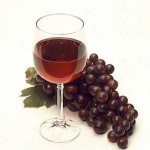During last decades medical society is trying to find the explanations for so called “French paradox” linked to red wine consumption. The French paradox refers to the observation that the French suffer a relatively low incidence of coronary heart disease, despite having a diet relatively rich in saturated fats. The phenomenon was first noted by Irish physician Samuel Black in 1819.
It is well know that French cuisine is full of fatty foods and increased consumption of wine. At the same time, the incidence of heart disease in France is 40% lower than predicted for their high-fat diet (especially for red wine users). So, where is the secret?
Research has led to some fascinating discoveries – red wine contain pretty powerful antioxidants (so called “polyphenols” and “resveratrol”) which not only protect the cardiovascular system from inflammation-induced oxidative damage but can provide another health benefits such as longer lifespan, cancer inhibition, protection of the nervous system, improved mental health, stress and depression prevention, etc. Some scientists suggest that red wine users (in limited portions) could have significantly lower risk of Alzheimer’s disease, cancer, diabetes and all of the things that go along with aging.
Scientists noted that polyphenols can protect body’s cells and tissues from damage that can lead to the development of diseases such as cancer and heart disease. Important to mention that polyphenols in wine primarily come from the colored skins of grapes, so red wine tends to have a greater concentration of polyphenols than white wine.
It was discovered also that European wines tend to have more polyphenols than American wines, in general.
Women absorb alcohol more rapidly than men because of their lower body water content and different levels of stomach enzymes – it means moderate wine consumption should be a lower amount for women than for men. Only moderate consumption of red wine can insure health benefits.
Red wine health benefits – Anticancer
Resveratrol benefits were demonstrated during laboratory tests on mammals – it has been shown that resveratrol can prevent and shrink cancer. Special attention was paid to its strong antiviral anti-fungal properties.
Red wine antioxidants can play a positive role in cases of breast cancer but in combination with alcohol, red wine is increasing not only risks for breast cancer development but also it increasing the risk for breast cancer recurrences.
Scientists from the University of Leicester (UK) reported that regular moderate red wine consumption can reduce the rate of bowel tumors by approximately 50%.
One study published in 2014 found that resveratrol may prevent head and neck cancer – the resveratrol kills damaged cells that can lead to cancer. It was noted that the more polyphenols, particularly resveratrol, in wine, the more the wine protects against colon cancer.
Researchers from Cedars-Sinai Medical Center in Los Angeles found that chemicals in the skins and seeds of red grapes reduce estrogen levels while raising testosterone in premenopausal women – this definitely results in a lower risk of developing breast cancer. It is not just red wine that has the beneficial compounds, but its raw material – red grape. They suggested that when women are choosing an alcoholic drink to consume, they should consider red wine.
Red wine health benefits – Depression
Spanish scientists reported that drinking red wine may reduce the risk of depression – women and men who drank two to seven glasses of wine per week were less likely to be diagnosed with depression. Better results were noted in clients with healthy lifestyle.
Red wine health benefits – Anti-aging
Researchers from Harvard Medical School reported that red wine has anti-aging properties – resveratrol is responsible for beneficial effect. Scientists from Harvard Medical School were first to proof the definite link between the anti-aging properties of resveratrol and specific gene.
Interesting to mention that anti-aging properties of red wine were well known for centuries – monasteries throughout Europe were convinced that their monks’ longer lifespans, compared to the rest of the population, was partly due to their moderate, regular consumption of wine.
A study carried out at the University of London found that procyanidins, compounds commonly found in red wine, keep the blood vessels healthy and are one of the factors that contribute towards longer life spans enjoyed by the people in Sardinia and the southwest of France.
Memory problems are considered as a common “side effect” of aging. During laboratory tests (on rats), researchers from Texas A&M Health Science Center College of Medicine found (2013) that resveratrol may help prevent age-related memory decline.
Red wine health benefits – Weight control
Korean researchers found (2012) that the compound piceatannol, which is found in red grapes and is similar to resveratrol, can block cellular processes that allow fat cells to develop and grow. They suggested that red wine (piceatannol) could be used for weight loss and weight control.
Red wine health benefits – Dental health
Professional Journal of Agricultural and Food Chemistry found (2014) that red wine could kill dangerous bacteria in the mouth that could cause dental diseases – it was suggested that red wine can prevent teeth cavities.



















